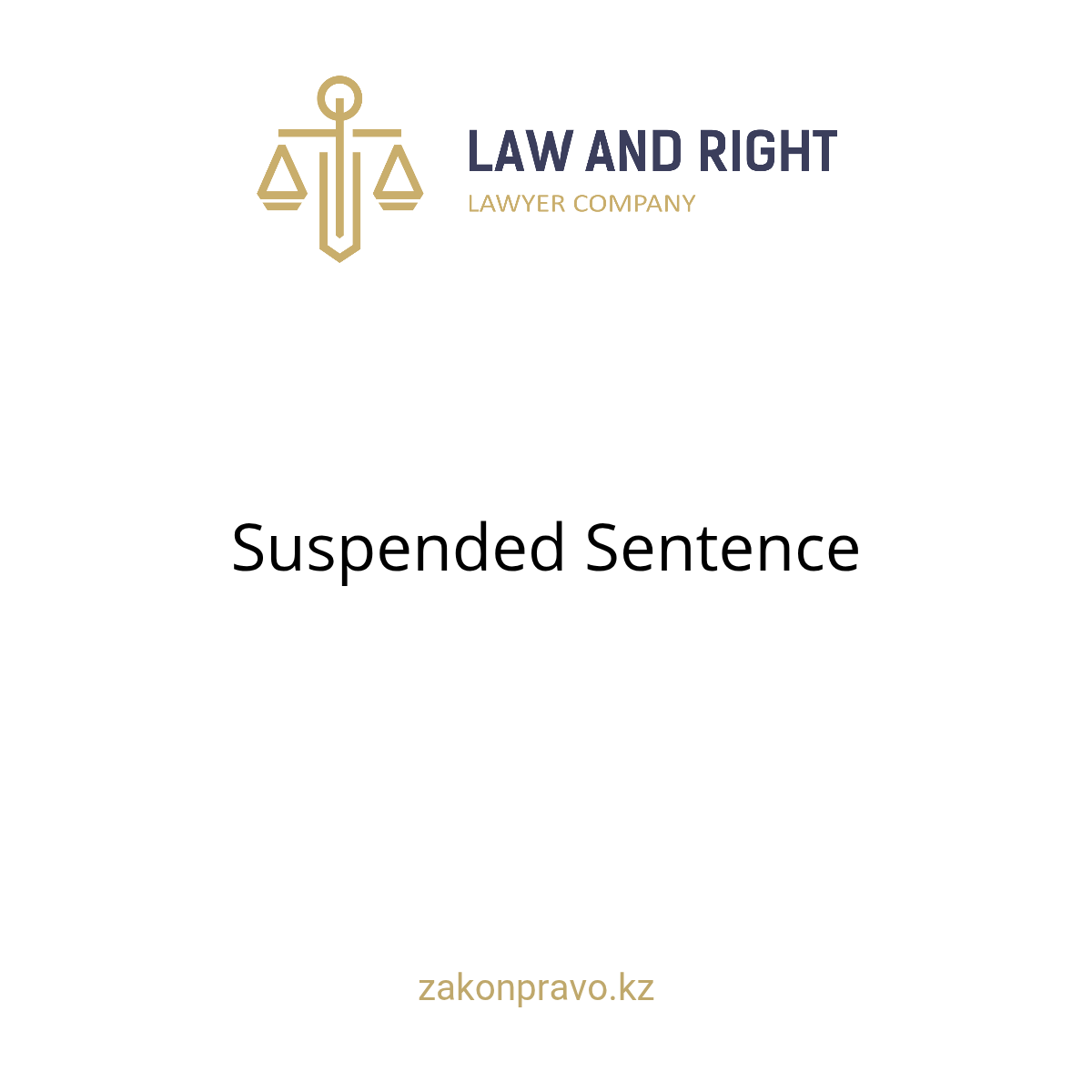Suspended Sentence
🔷 1. General Characteristics of the Institution of Suspended Sentencing
A suspended sentence is a legal compromise between the necessity of punishment and the possibility of rehabilitating the offender without isolating them from society. It involves imposing a sentence with a deferment of its execution, provided that the convicted person does not commit a new crime and complies with probationary conditions during the trial period.
📌 This institution serves preventive and rehabilitative purposes by reducing the prison population and offering a chance for reform without incarceration.
🔷 2. Structured Commentary by Article Sections
🔹 Part 1. Conditions for Application of a Suspended Sentence
"If, having imposed a custodial sentence, the court concludes that the offender can be corrected without serving the sentence..."
- Key condition: The court must be confident that the offender can be rehabilitated without imprisonment.
- The court must first assign a punishment (e.g., 3 years of imprisonment) and then suspend the execution of the sentence.
🔸 Judicial Practice Example:Citizen X, who committed theft (Article 188, Part 1 of the Criminal Code of Kazakhstan) for the first time and showed remorse and compensated the damage, was sentenced to 2 years of imprisonment conditionally, under probationary supervision for the full term.
🔹 Part 2. Factors Considered by the Court
The court must individualize the punishment, taking into account:
- the nature of the crime (intentional or negligent, violent or non-violent);
- the degree of public danger;
- the offender’s personal profile: age, family status, health, criminal record;
- mitigating and aggravating circumstances (Articles 55–56 of the Criminal Code).
📌 This means a suspended sentence is not automatic, but an evaluative and discretionary judicial decision.
🔹 Part 3. Probationary Supervision
🔸 According to Article 44, Part 2 of the Criminal Code, probationary supervision is oversight and support provided by an authorized body (the probation service under the Ministry of Internal Affairs).
| Category | Term of Probationary Supervision |
|---|---|
| Adult | Full duration of the suspended sentence |
| Minor | From 6 months to 1 year |
🔸 Exceptions: Foreigners and stateless persons subject to expulsion are not supervised, as it becomes irrelevant.
🔸 The law allows suspended sentences for minors who commit a repeat offense of minor or moderate gravity — reflecting a more humane approach toward children.
🔹 Part 4. Additional Restrictions and Penalties
🔹 Possible restrictions include:
- prohibition on certain activities;
- travel restrictions;
- bans on visiting specific places or contacting specific persons;
- requirements to pursue education or employment.
📌 These measures must be proportionate and justified by the court.
🔹 Part 5. Compulsory Educational Measures
🔹 Applied only to minors:
- warning;
- placement under parental or guardianship supervision;
- restriction of leisure time;
- obligation to compensate for harm;
- placement in a special educational institution.
📌 Legal basis: Article 85 of the Criminal Code.
🔹 Part 6. Restrictions on the Use of Suspended Sentencing
Suspended sentencing is not applied in the following cases:
| Category of Crime |
|---|
| Recidivism and dangerous recidivism (Art. 59) |
| Particularly serious crimes (Art. 3, para. 6) |
| Corruption-related crimes (Arts. 366–370) |
| Terrorism-related crimes |
| Extremist crimes |
| Torture (Art. 146) |
| Crimes committed by organized criminal groups |
| Crimes against the sexual integrity of minors |
🔸 Exception: Minors aged 14–18 who committed a sexual offense against another minor may receive a suspended sentence if certain conditions are met.
📌 Example: A 17-year-old boy who had consensual sex with a 15-year-old girl — in the absence of violence, the court may impose a suspended sentence.
🔷 3. Related Provisions of the Criminal Code
| Provision | Content |
|---|---|
| Art. 44 | Rules for assigning punishments |
| Arts. 55–56 | Mitigating and aggravating circumstances |
| Art. 85 | Educational measures for minors |
| Art. 70 | Release from punishment |
| Arts. 87–91 | Specifics of punishment for minors |
| Art. 189 of the CCP | Probation supervision procedure |
| Law “On Probation” | Powers and procedures for probation oversight (2016) |
🔷 4. International Standards
🔹 UN Minimum Rules on Non-Custodial Measures (Tokyo Rules):
- Suspended sentencing is an important alternative to imprisonment;
- Promotes reduced recidivism and social reintegration.
🔹 European Prison Rules:
- Recommend applying suspended sentences as a key tool of penal humanization, especially for non-violent offenses.
🔹 ECHR, Kudła v. Poland (2000):
→ The right to fair and proportionate punishment implies the active use of alternatives to imprisonment.
🔷 5. Conclusion
Article 63 of the Criminal Code of Kazakhstan is a key tool for the humanization of criminal justice, especially in regard to:
- first-time offenders;
- minors;
- individuals capable of rehabilitation without incarceration.
🔹 However, the application of the article is strictly limited in cases of serious, corrupt, sexual, and violent crimes. The court is required to individually justify the imposition of a suspended sentence, particularly in light of recidivism risks.
Attention!
Law and Law Law Law draws your attention to the fact that this document is basic and does not always meet the requirements of a particular situation. Our lawyers are ready to assist you in legal advice, drawing up any legal document suitable for your situation.
For more information, please contact a Lawyer / Attorney by phone: +7 (708) 971-78-58; +7 (700) 978 5755, +7 (700) 978 5085.
Attorney at Law Almaty Lawyer Legal Services Legal Advice Civil Criminal Administrative Cases Disputes Protection Arbitration Law Firm Kazakhstan Law Office Court Cases


